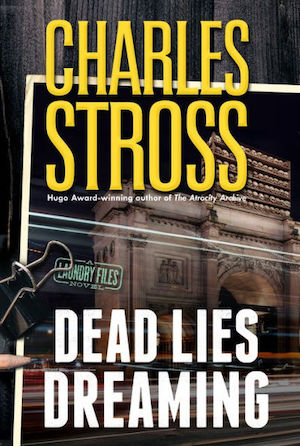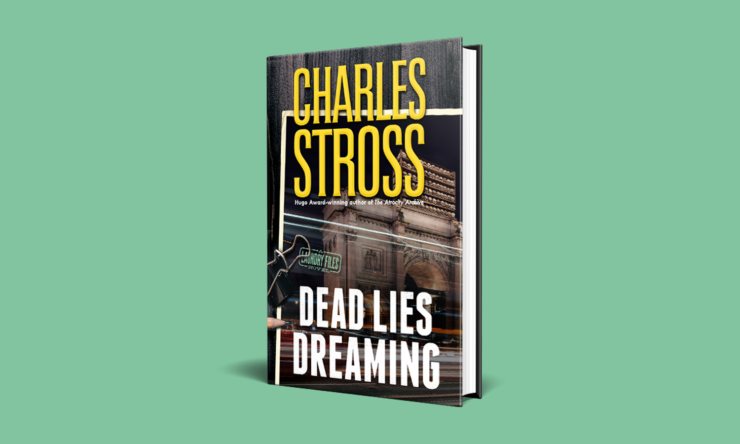The emergence of superpowers among the population has dovetailed with austerity measures to create the situation in which Wendy Deere finds herself: a thief-taker paid to hunt a gang of robbers using their unregistered powers to pull off heists. The gang themselves, meanwhile, are a mash-up of queer outcasts trying to raise enough funds for their leader, Imp, to film a new Peter Pan movie… but their cat-and-mouse game is far from the real problem: the reappearance of a concordance to the true Necronomicon. Cultist billionaire Rupert de Montfort Bigge sets his second in command to acquiring the book, and she just happens to be Imp’s sister—so naturally, who’s she going to hire to help out besides her supervillain thief sibling?
Dead Lies Dreaming is currently billed as the tenth book in the ‘Laundry Files’ series, but per Stross, it’s more accurate to call it the first book in a Laundry-adjacent spinoff: new characters and new concerns, set in the same shambling-toward-apocalypse world we’re familiar with from the spies and managers of the previous nine books. And—thanks in part to the tightly structured fervor of the novel’s plot—that shift in perspective works. Dead Lies Dreaming is at once smothering with grim nastiness and a breath of fresh air in the broader series, which is approaching an ultimate end soon.
Our central crew are a found-family featuring pansexual weirdo Imp and his sometimes-lover (whose superpower is depression) Doc, Black lesbian delivery courier Del, and their underage charge Game Boy, who is trans and left an abusive family. Wendy, too, is a lesbian—which becomes relevant when she gets involved with Del. All of the ‘good’ guys are queer and caring for one another, mess as that process might be. Stross addresses the rampant transphobia plaguing the UK through Game Boy in a manner I found purposeful: the kid has been put through hell, and even his older protectors sometimes fail to grasp how triggering the shit they say to him might be. Eve is also a fascinating protagonist, a blossoming psychopath whose knuckled-down understanding of the game she has to play to overtake the old boys’ club is… well, upsetting to say the least, but also rings true to the world at large.
Buy the Book


Dead Lies Dreaming
And while it might sound challenging to leap from our usual cast to a group of fresh faces, the structure of Dead Lies Dreaming makes the leap simple. It’s a heist novel, so by nature, it is contained and delimited within a set of time-restricted events. That’s also part of why it does, as I said, feel like a necessary and entertaining breather from the overarching plot of the series. The introduction of a crew of lovable thieves and their loathsome adversaries, plus all the crosses and double-crosses and scheming, vaults over the barrier of “getting to know a whole new cast” by hooking the reader onto a plot with a breakneck pace, excessively high stakes, and the general inherent fun of heists.
Spoilers follow.
Unsurprisingly, Stross constructs an elaborate but precise plot. He’s never failed to please on that score; this novel is no exception. Eve’s machinations, alongside the madcap approach of her sibling and his team, in conflict with Rupert’s multiple-crosses and the Bond and so on, keep us guessing until the end though we (through multiple POVs) have some insight… just not quite the right amount to know for sure until it all wraps up. Among all the black comedy and utterly horrifying violence—with no holds barred in terms of form or detail, there, so beware—the technical construction of the book’s actual narrative shines through.
Stross is messing with more cultural material than the conventional heist novel, though, as familiar Laundry readers surely expect. The ingredients in the stewpot of ghoulish reinterpretation this time are the novels of J. M. Barry, the mythologies of London from the Blitz to the Ripper, and the problem of time travel. As if the twisty-turning plot of the heist itself, with the players and their constant double-blinds shifting across the board, wasn’t enough—we’ve also got a dreamscape that crosses into alternate versions of what London might once have been or could’ve been, subsumed under what did become. And somehow, at least based on Whitechapel, it seems things actually could’ve turned out worse than they did.
Nerd that I am, I did get some gleeful mileage out of the recurrent presence of the Piers Gaveston Society (if you’re unfamiliar, here’s a podcast) and its nightmare bone-collecting necrosex version from the dream world. One of the smartest features of the ‘Laundry Files’ books is their connection to present politics and their razor’s-edge social critiques, so I’m delighted to see that shift perspective to a different class-and-career cast and their interactions with the system: privatized policing, hedge funds… and in larger scope, the fact that billionaires operate on a tier outside all of our quaint fancies of a rule of law. The narrative significance of fiddly bureaucracy, fine print, and red tape continues on as well, though Dead Lies Dreaming is set outside of government proper; it’s refreshing to see how cleverly that functions here.
I’m also not above admitting that I found a forbidden-wish-fulfillment sort of satisfaction with the novel’s ultimate conclusions. While no one in the book is, shall we say, super nice, the villains who well and truly get theirs at the hands of our ragtag queer family are a billionaire sadist white guy from an old-money British family and an ex-military American who is a gallingly, openly misogynist homophobe. So, there’s that, you know? Each of them are demolished in the end partially by their categorical disregard for Eve because she’s a conventionally attractive woman, and by their inability to understand that she’s playing a longer game putting up with their shit. She’s ten times the high-stakes poker player either of them will ever be. (But like, is she also a total nightmare person? Resounding yes.)
Despite its setting in a gruesomely dissolving state that has returned to activities like regular public executions, Dead Lies Dreaming manages to have what the reader might call a happy ending. Eve has won her gambit, and though she’s far from pleasant or safe, she has throughout the book made notes to herself like ‘respect her subordinates’ boundaries where possible.’ Imp has regained ownership of his ancestral home, instead of just squatting in it, wherein he can house his boyfriend and their chosen family without struggle. Game Boy will get his gender confirmation settled, Del will have a job with her new girlfriend Wendy, and so on. The Lost Boys (and Girls) escaped the nastier version of dreamland and painted the door shut again. All isn’t well, of course, because it’s the Laundry Files… but there’s something settling about seeing a group of queer outsiders survive in one piece to find some good at the end, as bad as the world itself remains.
Dead Lies Dreaming is available from Tordotcom Publishing.
Lee Mandelo is a writer, critic, and editor whose primary fields of interest are speculative fiction and queer literature, especially when the two coincide. They have two books out, Beyond Binary: Genderqueer and Sexually Fluid Speculative Fiction and We Wuz Pushed: On Joanna Russ and Radical Truth-telling, and in the past have edited for publications like Strange Horizons Magazine. Other work has been featured in magazines such as Stone Telling, Clarkesworld, Apex, and Ideomancer.










